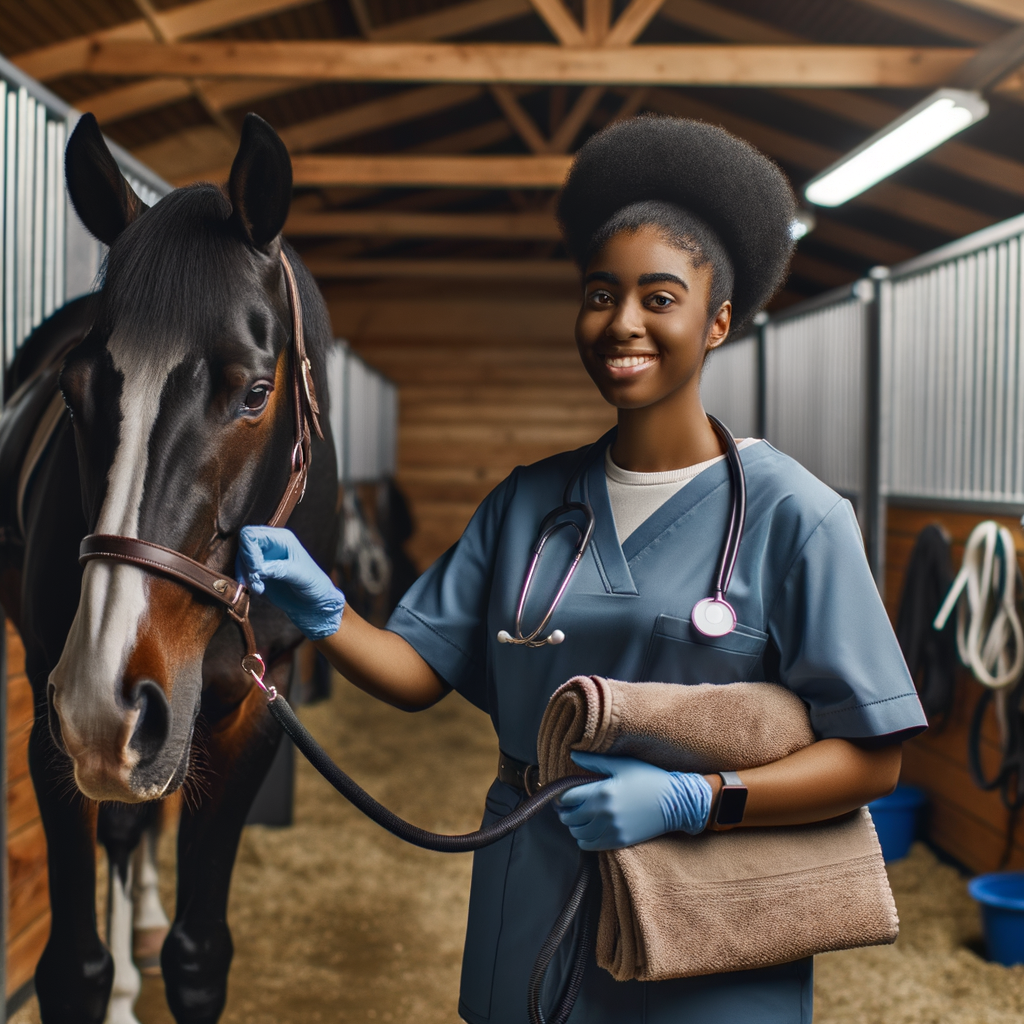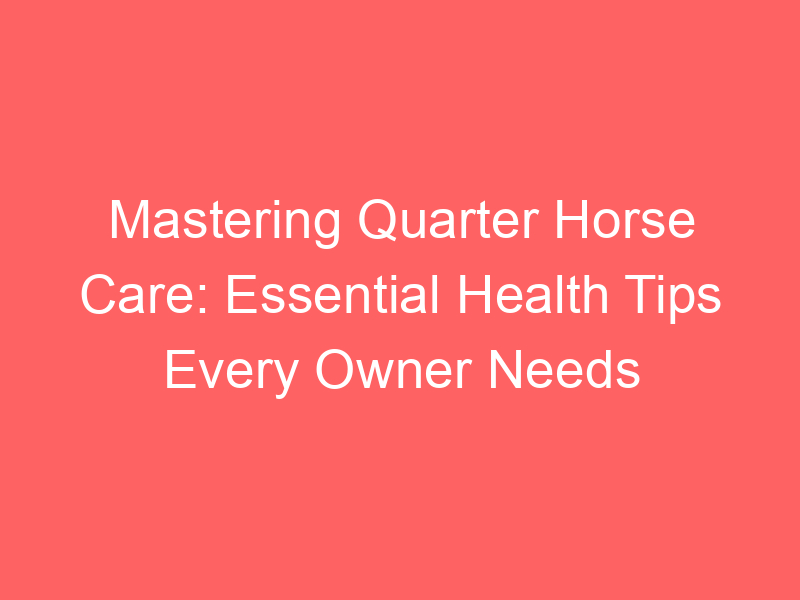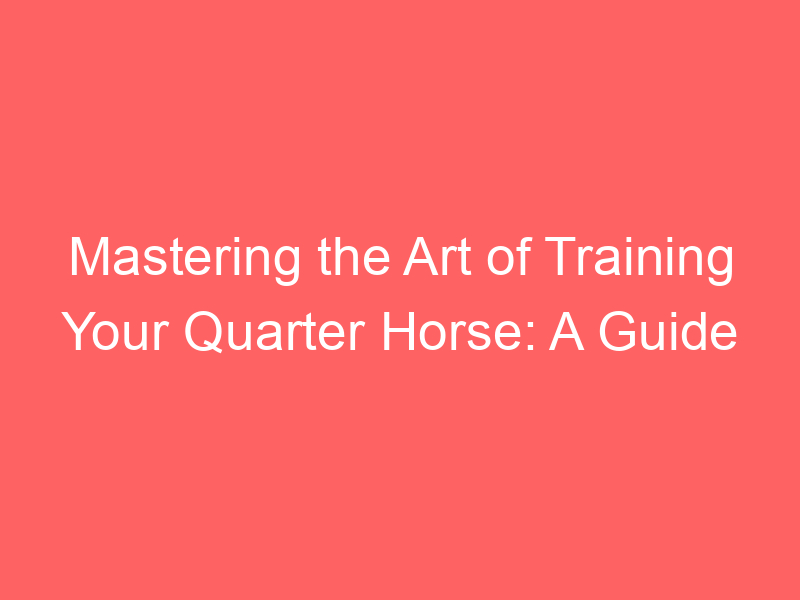
Introduction to Quarter Horse Health Care
As a horse owner, your primary responsibility is to ensure the health and well-being of your equine companion. This is especially true for Quarter Horses, a breed known for their versatility and athleticism. In this guide, we will delve into the essentials of Quarter Horse health care, providing you with the knowledge you need to keep your horse in top shape.
-
Understanding the Importance of Quarter Horse Maintenance
Proper maintenance is crucial for the health of any horse, but it’s particularly important for Quarter Horses. Known for their agility and speed, these horses are often involved in rigorous activities such as racing and rodeo events. As such, they require a higher level of care to ensure they remain healthy and active.
Regular grooming, balanced nutrition, and routine veterinary checks are just a few of the essential maintenance tasks that can help prevent health issues and prolong your horse’s life. Remember, a well-maintained horse is a happy and productive horse.
-
Essential Health Tips for Quarter Horses
Here are some essential health tips to keep your Quarter Horse in peak condition:
- Regular Exercise: Quarter Horses are active animals that require regular exercise to maintain their health and happiness. Make sure your horse gets plenty of physical activity every day.
- Proper Nutrition: A balanced diet is crucial for your horse’s health. Ensure they get the right mix of grains, hay, fruits, vegetables, and clean water.
- Routine Vet Checks: Regular veterinary checks can help detect any potential health issues early. Make it a point to have your horse examined by a vet at least twice a year.
- Dental Care: Just like humans, horses also need dental care. Regular teeth check-ups and floating (smoothing of the teeth) can prevent dental problems and ensure your horse’s overall health.
In conclusion, caring for a Quarter Horse requires knowledge, dedication, and a lot of love. By understanding the importance of maintenance and following our essential health tips, you can ensure your horse lives a long, healthy, and happy life.
Equine Essentials: The Basics of Horse Health and Care
In this section, we will delve into the vital aspects of horse health and care, focusing specifically on feeding and nutrition. Proper nutrition is paramount for maintaining the health and vitality of your Quarter Horse. Let’s explore this in more detail.
Feeding and Nutrition
Feeding and nutrition form the cornerstone of horse health. A well-balanced diet is essential for the overall well-being of a Quarter Horse. Let’s break down the key aspects of feeding and nutrition for these majestic creatures.
- Understanding the dietary needs of a Quarter Horse
- Essential nutrients for maintaining Quarter Horse health
Quarter Horses, known for their agility and speed, require a diet rich in energy. Their diet should be a balance of forages, grains, and supplements. Forages, such as hay and pasture, should form the bulk of their diet, making up about 50-75% of it. Grains like oats and corn can be added for extra energy, but should be given in moderation to prevent digestive issues. Supplements can be used to fill any nutritional gaps.
There are several essential nutrients that a Quarter Horse needs for optimal health. These include:
| Nutrient | Role |
|---|---|
| Proteins | Needed for growth, muscle development, and repair. |
| Fats | Provide concentrated energy and help in absorption of certain vitamins. |
| Carbohydrates | Major source of energy. |
| Vitamins and Minerals | Essential for various bodily functions and overall health. |
| Water | Crucial for digestion, temperature regulation, and overall hydration. |
Remember, each horse is unique and may have specific dietary needs. Always consult with a veterinarian or an equine nutritionist to ensure your horse is getting the right nutrients in the right amounts.
Exercise and Training
One of the most crucial aspects of Quarter Horse health and care is regular exercise and effective training. Let’s delve into why these are so important and how to implement them effectively.
- The Importance of Regular Exercise for Quarter Horses
- Effective Training Methods for Quarter Horses
Exercise is not just about keeping your Quarter Horse in shape. It’s about overall health, longevity, and quality of life. Regular exercise helps to maintain a healthy weight, which can prevent a host of health problems such as joint issues and heart disease. It also promotes good digestion, reduces stress, and improves muscle tone and strength.
Studies have shown that horses that exercise regularly are less likely to develop behavioral problems. They are happier, more relaxed, and easier to manage. So, regular exercise is not just good for your horse’s body, it’s good for their mind too.
Training your Quarter Horse effectively is just as important as regular exercise. The right training methods can help your horse to be more responsive, obedient, and safer to handle. Here are some effective training methods for Quarter Horses:
| Training Method | Description |
|---|---|
| Groundwork | This involves working with your horse from the ground to teach them basic commands and improve their responsiveness. |
| Riding Lessons | These are designed to improve your horse’s skills under saddle, including their balance, rhythm, and suppleness. |
| Desensitization Training | This helps your horse to become more comfortable with different environments and situations, reducing their stress and anxiety. |
Remember, every horse is unique, so what works for one might not work for another. It’s important to be patient and consistent, and to always use positive reinforcement to reward good behavior.
Quarter Horse Maintenance: A Comprehensive Horse Owner Guide
Proper maintenance of your Quarter Horse is crucial for its health and happiness. This guide will provide you with comprehensive information on grooming and hoof care, two essential aspects of horse maintenance.
Grooming and Hoof Care
Grooming your Quarter Horse not only keeps it looking its best, but it also promotes healthy skin and coat. On the other hand, hoof care is vital for preventing painful conditions and ensuring your horse can move comfortably. Let’s delve into these topics.
- Step-by-step guide to grooming a Quarter Horse
Grooming a Quarter Horse requires patience and attention to detail. Here’s a simple step-by-step guide:
- Begin by securing your horse in a safe, comfortable area.
- Use a curry comb in a circular motion to loosen dirt and hair.
- Follow up with a stiff-bristle brush to remove the loosened dirt and hair.
- Use a soft-bristle brush to remove any remaining dust and add shine to the coat.
- Don’t forget to clean the face gently with a damp cloth.
- Finally, comb the mane and tail, being careful to untangle any knots.
Remember, grooming is also a great opportunity to check for any skin issues or injuries.
- Essential tips for maintaining healthy hooves
Healthy hooves are fundamental to a horse’s wellbeing. Here are some essential tips:
- Regularly clean your horse’s hooves to prevent the buildup of dirt and stones.
- Check for signs of disease or injury, such as cracks or heat in the hoof.
- Ensure your horse has a balanced diet, as nutrition plays a key role in hoof health.
- Regularly schedule farrier visits for hoof trimming and shoeing, if necessary.
By following these steps, you can ensure your Quarter Horse’s hooves remain healthy and strong.
Health Check-ups and Vaccinations
As a responsible horse owner, it’s crucial to understand the importance of regular health check-ups and essential vaccinations for your Quarter Horse. These two aspects play a significant role in maintaining your horse’s overall health and ensuring their longevity.
-
Understanding the Importance of Regular Health Check-ups
Regular health check-ups are a vital part of horse care. They help in early detection of potential health issues, allowing for timely treatment and prevention of further complications. According to a study by the American Association of Equine Practitioners, regular check-ups can help prevent 60% of health issues in horses.
During these check-ups, the veterinarian will examine the horse’s body condition, heart rate, respiratory rate, temperature, and overall behavior. They may also perform blood tests and other diagnostic procedures if necessary. This comprehensive examination helps ensure your Quarter Horse is in its best health condition.
-
Essential Vaccinations for Quarter Horses
Vaccinations are a crucial part of horse health care. They protect your horse from various diseases that can cause serious health problems, and in some cases, even death. The American Veterinary Medical Association recommends a series of core vaccines for all horses, regardless of their breed.
For Quarter Horses, the essential vaccinations include Tetanus, Eastern/Western Equine Encephalomyelitis, West Nile Virus, and Rabies. Additionally, depending on your horse’s lifestyle and geographical location, they may also need vaccines for Equine Influenza, Equine Herpesvirus, and Strangles.
Vaccine Disease Protected Against Tetanus Lockjaw Eastern/Western Equine Encephalomyelitis Brain inflammation West Nile Virus Neurological disease Rabies Fatal neurological disease Remember, each horse is unique, and their vaccination needs may vary. Always consult with your veterinarian to determine the best vaccination schedule for your Quarter Horse.
Advanced Care Essentials for Horses
In this section, we will delve into the advanced care essentials for horses, focusing primarily on dental care. Dental health is a critical aspect of horse care that is often overlooked. Let’s understand why it’s important and how you can perform a basic dental check-up at home.
Dental Care
- Understanding the Importance of Dental Care in Horses
- How to Perform a Basic Dental Check-Up at Home
Just like humans, horses also require regular dental care. A horse’s teeth continue to grow throughout its life, which can lead to dental issues if not properly managed. Poor dental health can affect a horse’s ability to chew and digest food, leading to weight loss, colic, and other health problems.
According to a study by the American Association of Equine Practitioners, nearly 60% of health issues in horses are related to poor dental health. This statistic highlights the importance of regular dental check-ups and maintenance.
While professional dental check-ups by a vet are crucial, horse owners can also perform basic check-ups at home to monitor their horse’s dental health. Here’s a simple guide:
| Step | Description |
|---|---|
| 1 | Start by observing your horse’s eating habits. Difficulty in chewing, dropping food, or weight loss could indicate a dental problem. |
| 2 | Check for any signs of pain or discomfort in the horse’s face or jaw. |
| 3 | Examine the horse’s mouth for any foul smell, which could be a sign of infection or disease. |
| 4 | Feel the horse’s cheeks and jaw for any swelling or lumps. |
| 5 | Lastly, if you feel comfortable doing so, you can gently open the horse’s mouth and visually inspect the teeth for any abnormalities. |
Remember, these steps are not a substitute for professional dental care, but they can help you keep a close eye on your horse’s dental health between vet visits.
Managing Common Health Issues
As a responsible horse owner, it’s essential to be aware of the common health issues that can affect your Quarter Horse. Recognizing the signs early and knowing when to seek veterinary help can make a significant difference in your horse’s health and wellbeing.
- Recognizing and treating common health issues in Quarter Horses
- When to seek veterinary help
Quarter Horses, like all breeds, can be susceptible to certain health issues. Some of the most common include colic, lameness, and respiratory problems.
Colic is a term used to describe severe, often fluctuating pain in the abdomen that is caused by the spasms of the horse’s gut. Symptoms can include restlessness, sweating, and a lack of appetite. If you suspect your horse has colic, it’s important to call a vet immediately.
Lameness can be caused by a variety of issues, from a simple stone bruise to more serious conditions like arthritis or tendon injuries. Regular hoof care and monitoring your horse’s gait can help prevent and treat many cases of lameness.
Respiratory problems can be caused by allergies, infections, or lung disease. If your horse is coughing, has a runny nose, or is having difficulty breathing, it’s time to call the vet.
It’s always better to be safe than sorry when it comes to your horse’s health. If your horse is showing signs of distress, such as changes in behavior, loss of appetite, or physical symptoms like a runny nose or limping, it’s time to call the vet. Remember, early intervention can often prevent a minor issue from becoming a major one.
In conclusion, managing common health issues in Quarter Horses involves a combination of regular monitoring, preventative care, and knowing when to seek professional help. By staying informed and proactive, you can ensure your horse lives a long, healthy, and happy life.
Conclusion: Mastering Quarter Horse Care
As we reach the end of our comprehensive guide on Quarter Horse care, it’s important to revisit the key points we’ve discussed. This will not only reinforce the knowledge you’ve gained but also ensure that you are well-equipped to provide the best care for your Quarter Horse.
- Recap of Quarter Horse care tips:
- Importance of continuous learning for horse owners:
Remember, the health and wellbeing of your Quarter Horse depends on a balanced diet, regular exercise, and routine veterinary check-ups. It’s also crucial to maintain a clean and safe environment for your horse, which includes regular stall cleaning and safe fencing. Additionally, grooming your horse not only keeps them looking their best but also allows you to check for any signs of illness or injury.
As a horse owner, your learning journey never ends. New research and advances in equine care are constantly emerging, and staying informed about these developments can significantly enhance the quality of care you provide. Remember, a well-informed owner is the best asset a Quarter Horse can have.
In conclusion, mastering Quarter Horse care is a rewarding journey that requires dedication, patience, and a commitment to continuous learning. By following the tips and guidelines we’ve discussed in this guide, you can ensure that your Quarter Horse leads a healthy, happy, and fulfilling life.
| Key Care Aspects | Importance |
|---|---|
| Proper Nutrition | Ensures the horse’s overall health and vitality |
| Regular Exercise | Keeps the horse physically fit and mentally stimulated |
| Routine Vet Check-ups | Helps detect any health issues early and maintain the horse’s health |
| Safe Environment | Prevents injuries and provides a comfortable living space |
| Continuous Learning | Enables the owner to provide the best care based on the latest research and developments |






